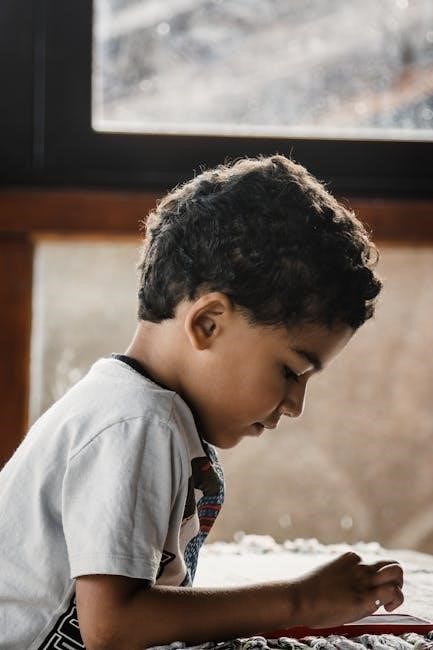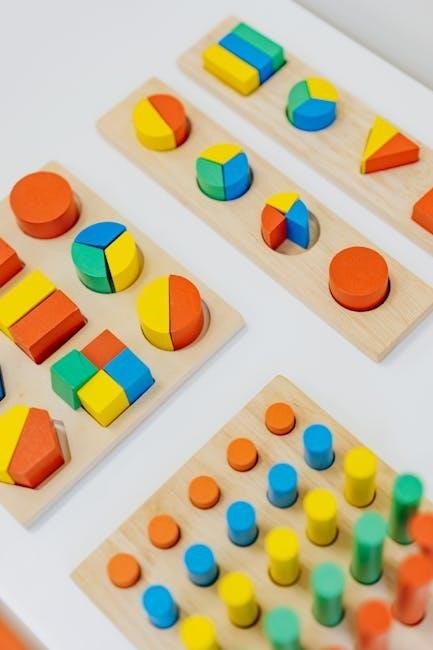The Iowa Early Learning Standards (IELS) provide a framework for understanding what young children should know and be able to do from birth to age 5. These standards guide curriculum planning, assessment, and family engagement, ensuring developmentally appropriate experiences for all children.
Purpose of the IELS
The Iowa Early Learning Standards (IELS) aim to provide a comprehensive framework for early childhood education, ensuring young children develop essential skills and knowledge. The standards serve as a guide for educators, caregivers, and families to support children’s growth from birth to age 5. By outlining developmentally appropriate expectations, the IELS help create consistent learning experiences across various settings. They also emphasize the importance of aligning curriculum planning and assessment practices with children’s developmental needs. Additionally, the standards foster collaboration among stakeholders, including schools, childcare providers, and families, to promote a cohesive approach to early childhood education. This ensures that all children in Iowa have equitable opportunities to thrive academically, socially, and emotionally.
Importance of Developmentally Appropriate Standards
The Iowa Early Learning Standards (IELS) emphasize developmentally appropriate practices to ensure children’s experiences are tailored to their unique stages of growth. These standards recognize that children develop at different rates and require environments that support their individual needs. By focusing on age-appropriate skills and knowledge, the IELS promote engaging and meaningful learning experiences. Developmentally appropriate standards also foster a strong foundation for future academic success, as they align with children’s natural curiosity and readiness to learn. This approach ensures that early childhood education is both effective and equitable, preparing children for a smooth transition to preschool and beyond.

Key Areas of Development in IELS
The Iowa Early Learning Standards focus on essential developmental areas, including Approaches to Learning and Curiosity and Initiative, fostering skills like exploration and problem-solving in young children.
Approaches to Learning
Approaches to Learning in the Iowa Early Learning Standards emphasize skills like problem-solving, critical thinking, and creativity. These skills are essential for children to engage actively with their environment and explore ideas. The standards highlight the importance of curiosity, initiative, and persistence, enabling children to navigate challenges and develop a lifelong love for learning. By fostering these approaches, educators and caregivers support children in building a strong foundation for future academic and personal success. These skills are integrated into daily activities, ensuring that children develop the confidence and resilience needed to thrive in school and beyond. This focus aligns with the Iowa Core Standards, promoting a seamless transition from early childhood to preschool.
Curiosity and Initiative in Early Childhood Development
Curiosity and initiative are foundational skills in early childhood development, encouraging children to explore their environment, engage in experiences, and learn new skills. The Iowa Early Learning Standards emphasize fostering these traits through interactive and exploratory activities. By nurturing curiosity, children develop problem-solving abilities and critical thinking, which are essential for lifelong learning. Initiative helps children take ownership of their learning, building confidence and resilience. These skills are integrated into daily routines, supporting children in becoming active learners. The standards provide guidance for caregivers and educators to create environments that promote exploration and creativity, ensuring children develop a love for learning and a strong foundation for future success.
Alignment with Iowa Core Standards
The Iowa Early Learning Standards align with the Iowa Core Standards, ensuring a smooth transition from early childhood to preschool. This alignment supports continuity in learning and development.
Transition from Early Childhood to Preschool
The Transition from Early Childhood to Preschool is supported by the Iowa Early Learning Standards (IELS), which align with the Iowa Core Standards. This alignment ensures a smooth progression for children, bridging the gap between early care and formal preschool education. The standards emphasize developmentally appropriate practices, fostering readiness skills that prepare children for future academic success. By integrating these standards, educators and caregivers can create consistent learning experiences, addressing the social, emotional, and cognitive needs of young children. This seamless transition is critical for building a strong foundation for lifelong learning and achieving the vision of Early Childhood Iowa.
Curriculum Planning and Assessment
The Iowa Early Learning Standards (IELS) serve as a foundation for curriculum planning and assessment, ensuring young children develop essential skills. These standards guide educators in creating developmentally appropriate experiences, aligning with children’s natural growth. Assessments are embedded in daily activities, focusing on observation and documentation to track progress. The IELS emphasize the importance of play-based learning and intentional teaching strategies. By aligning curriculum and assessment practices, early childhood programs can support children’s holistic development. This approach fosters continuity in learning and prepares children for future academic success, ensuring a strong connection between early care and formal education.

Curriculum and Assessment Experiences
The Iowa Early Learning Standards (IELS) provide a framework for curriculum and assessment experiences from birth to age 5, emphasizing play-based learning and intentional teaching. These standards guide the development of experiences that support children’s holistic growth, ensuring they are prepared for future academic success.
Guiding Principles for Early Care and Education
The Iowa Early Learning Standards (IELS) are rooted in developmentally appropriate practices that support young children’s social, emotional, physical, and cognitive development. These principles emphasize fostering curiosity and initiative, promoting play-based learning, and ensuring inclusive environments that respect diversity. The standards encourage collaboration between families, educators, and caregivers to create meaningful experiences tailored to each child’s needs. By aligning with research-based practices, the IELS provide a foundation for high-quality early care and education, ensuring children are well-prepared for future academic and lifelong success. These principles also highlight the importance of family engagement and the role of caregivers in nurturing early learning.
Aligning Curriculum with Learning Standards
Aligning curriculum with the Iowa Early Learning Standards (IELS) ensures that early care and education programs provide cohesive, research-based experiences for young children. The standards serve as a framework for selecting materials and designing activities that promote developmental milestones. By aligning curriculum with these standards, educators and caregivers can create intentional learning experiences that support children’s growth across all developmental domains. This alignment also facilitates a smooth transition from early childhood to preschool programs. The IELS emphasize the importance of play-based learning and meaningful interactions, ensuring that curriculum design is both engaging and effective in preparing children for future academic success.

Tools and Resources for Implementation
The Iowa Early Learning Standards provide essential tools and resources to support educators, including guiding documents and alignment guides to ensure successful implementation in early childhood programs.
Materials for Iowa Early Learning Standards
The Iowa Early Learning Standards (IELS) are supported by various materials, including the 3rd Edition PDF, which outlines developmental expectations for children from birth to age 5. These resources provide guidance for curriculum planning, assessment, and family engagement. The standards are aligned with The Creative Curriculum and Teaching Strategies GOLD, offering educators structured frameworks for implementation. Additional materials include alignment guides, such as the IELS and Iowa Core Alignment document, which bridges early childhood education with preschool and kindergarten standards. These tools ensure consistency and quality in early care and education settings, fostering healthy development and future success for all children.
Family Engagement and Support
Family engagement is a cornerstone of the Iowa Early Learning Standards (IELS), emphasizing the role of families in early childhood development. The standards provide resources to help families understand their children’s learning and developmental milestones. Tools like the IELS Family Guide and alignment documents with The Creative Curriculum offer insights into how families can support learning at home. These materials encourage collaboration between families and educators, fostering a shared commitment to children’s success. By involving families, the IELS ensure a cohesive approach to early education, promoting healthy growth and readiness for future academic and personal achievements, aligning with the vision of Early Childhood Iowa.

Future Implications of the IELS
The Iowa Early Learning Standards aim to ensure all children are prepared for future success, aligning with long-term educational goals and fostering a vision of healthy, successful development.
VISION of Early Childhood Iowa
The vision of Early Childhood Iowa is that every child, from birth, will be healthy and successful. This vision guides efforts to ensure all children have equitable opportunities to thrive. By aligning with the Iowa Early Learning Standards, it supports a foundation for lifelong learning and well-being. The vision emphasizes collaboration across sectors, including education, health, and family support, to create cohesive systems. It prioritizes early interventions, quality care, and family engagement to address disparities. Ultimately, the vision aims to empower children, families, and communities, fostering a future where every child can reach their full potential and contribute to society meaningfully.
